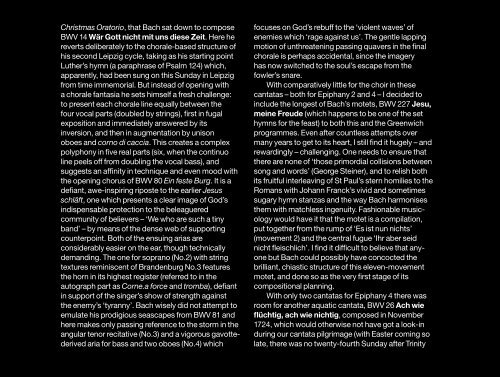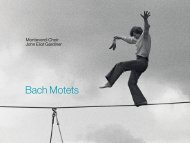Download CD booklet - Monteverdi Choir
Download CD booklet - Monteverdi Choir
Download CD booklet - Monteverdi Choir
Sie wollen auch ein ePaper? Erhöhen Sie die Reichweite Ihrer Titel.
YUMPU macht aus Druck-PDFs automatisch weboptimierte ePaper, die Google liebt.
Christmas Oratorio, that Bach sat down to compose<br />
BWV 14 Wär Gott nicht mit uns diese Zeit. Here he<br />
reverts deliberately to the chorale-based structure of<br />
his second Leipzig cycle, taking as his starting point<br />
Luther’s hymn (a paraphrase of Psalm 124) which,<br />
apparently, had been sung on this Sunday in Leipzig<br />
from time immemorial. But instead of opening with<br />
a chorale fantasia he sets himself a fresh challenge:<br />
to present each chorale line equally between the<br />
four vocal parts (doubled by strings), first in fugal<br />
exposition and immediately answered by its<br />
inversion, and then in augmentation by unison<br />
oboes and corno di caccia. This creates a complex<br />
polyphony in five real parts (six, when the continuo<br />
line peels off from doubling the vocal bass), and<br />
suggests an affinity in technique and even mood with<br />
the opening chorus of BWV 80 Ein feste Burg. It is a<br />
defiant, awe-inspiring riposte to the earlier Jesus<br />
schläft, one which presents a clear image of God’s<br />
indispensable protection to the beleaguered<br />
community of believers – ‘We who are such a tiny<br />
band’ – by means of the dense web of supporting<br />
counterpoint. Both of the ensuing arias are<br />
considerably easier on the ear, though technically<br />
demanding. The one for soprano (No.2) with string<br />
textures reminiscent of Brandenburg No.3 features<br />
the horn in its highest register (referred to in the<br />
autograph part as Corne.a force and tromba), defiant<br />
in support of the singer’s show of strength against<br />
the enemy’s ‘tyranny’. Bach wisely did not attempt to<br />
emulate his prodigious seascapes from BWV 81 and<br />
here makes only passing reference to the storm in the<br />
angular tenor recitative (No.3) and a vigorous gavottederived<br />
aria for bass and two oboes (No.4) which<br />
focuses on God’s rebuff to the ‘violent waves’ of<br />
enemies which ‘rage against us’. The gentle lapping<br />
motion of unthreatening passing quavers in the final<br />
chorale is perhaps accidental, since the imagery<br />
has now switched to the soul’s escape from the<br />
fowler’s snare.<br />
With comparatively little for the choir in these<br />
cantatas – both for Epiphany 2 and 4 – I decided to<br />
include the longest of Bach’s motets, BWV 227 Jesu,<br />
meine Freude (which happens to be one of the set<br />
hymns for the feast) to both this and the Greenwich<br />
programmes. Even after countless attempts over<br />
many years to get to its heart, I still find it hugely – and<br />
rewardingly – challenging. One needs to ensure that<br />
there are none of ‘those primordial collisions between<br />
song and words’ (George Steiner), and to relish both<br />
its fruitful interleaving of St Paul’s stern homilies to the<br />
Romans with Johann Franck’s vivid and sometimes<br />
sugary hymn stanzas and the way Bach harmonises<br />
them with matchless ingenuity. Fashionable musicology<br />
would have it that the motet is a compilation,<br />
put together from the rump of ‘Es ist nun nichts’<br />
(movement 2) and the central fugue ‘Ihr aber seid<br />
nicht fleischlich’. I find it difficult to believe that anyone<br />
but Bach could possibly have concocted the<br />
brilliant, chiastic structure of this eleven-movement<br />
motet, and done so as the very first stage of its<br />
compositional planning.<br />
With only two cantatas for Epiphany 4 there was<br />
room for another aquatic cantata, BWV 26 Ach wie<br />
flüchtig, ach wie nichtig, composed in November<br />
1724, which would otherwise not have got a look-in<br />
during our cantata pilgrimage (with Easter coming so<br />
late, there was no twenty-fourth Sunday after Trinity<br />
14






